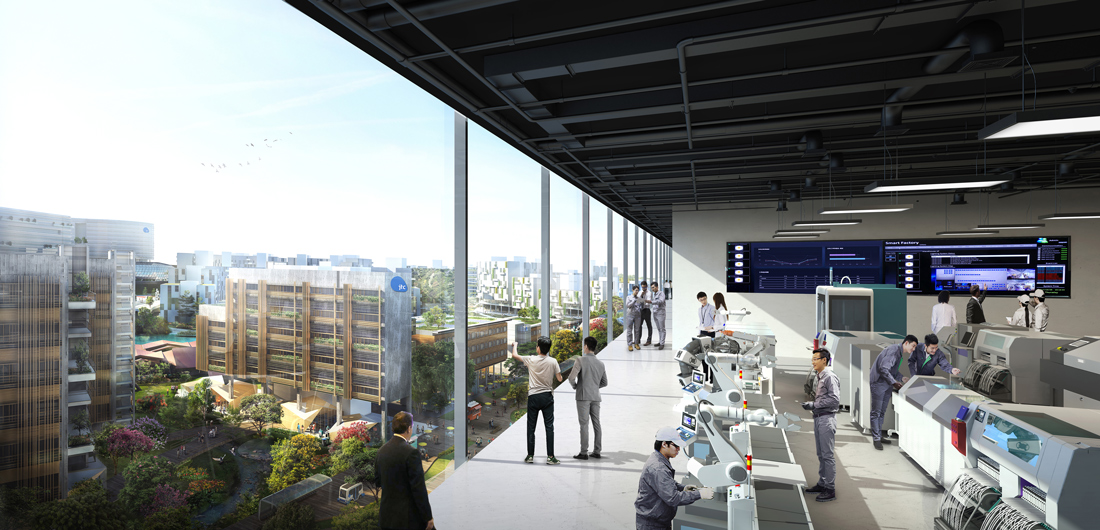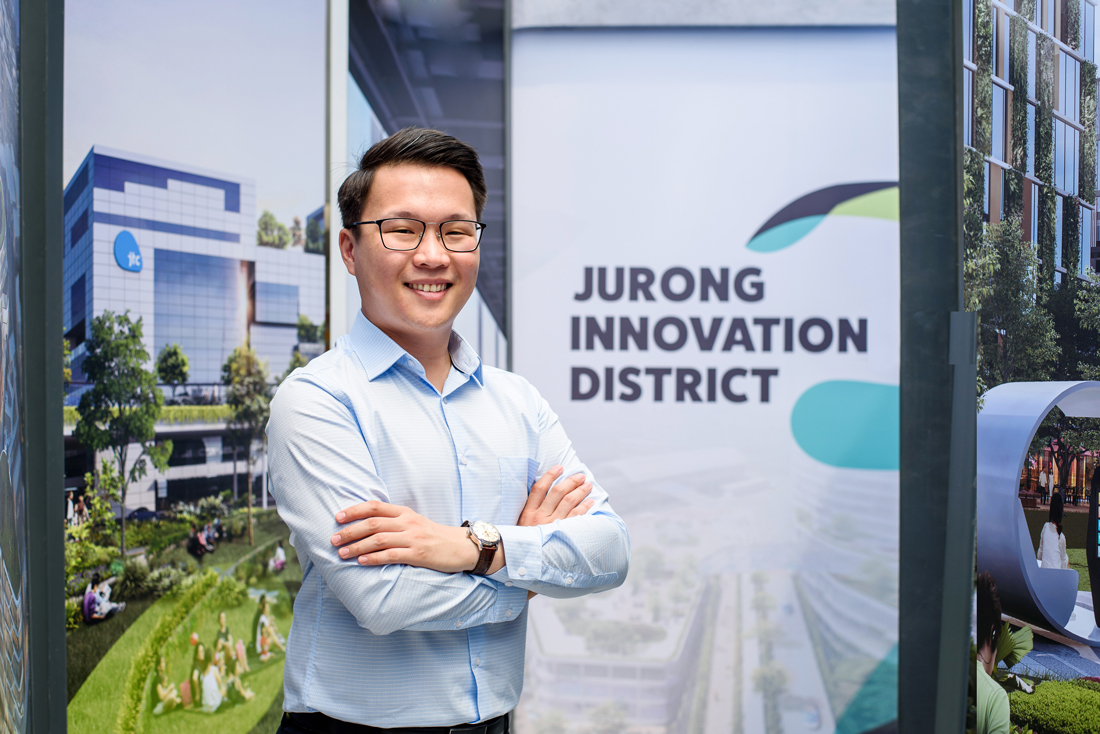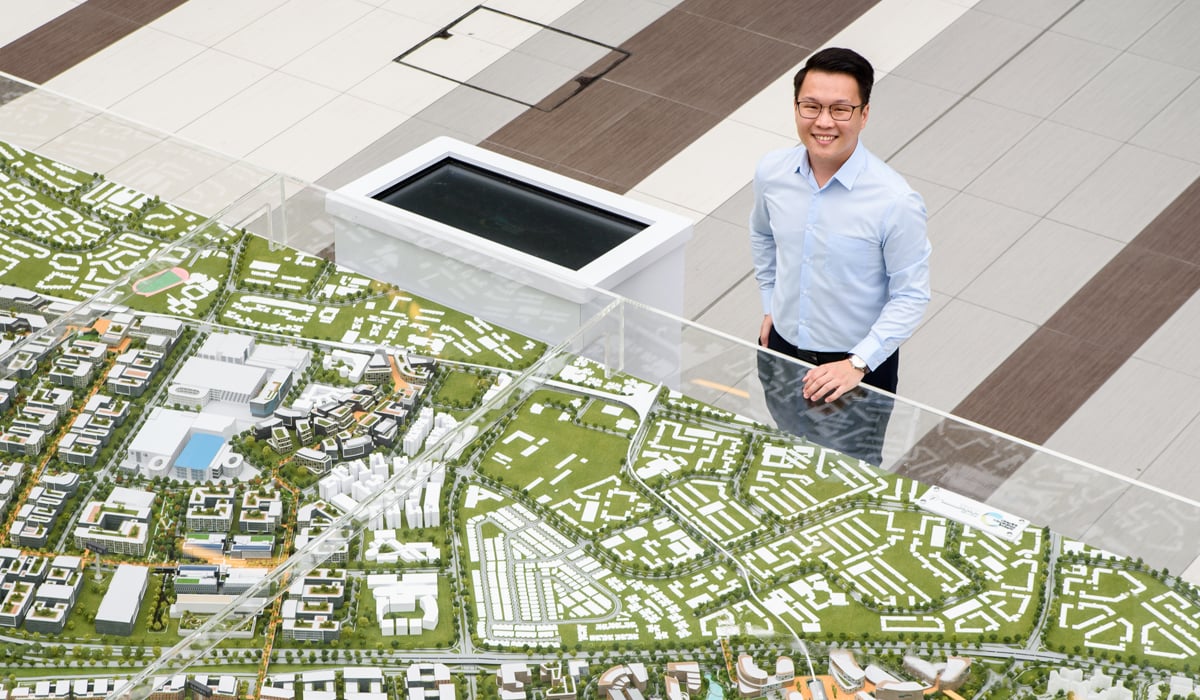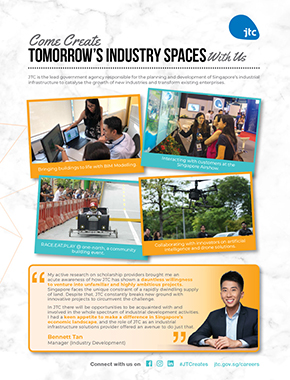Toh Wei Jie, Assistant Manager in the Precision
Engineering & Construction Cluster, facilitates
the transformation of Singapore’s manufacturing
sector. He is a JTC Mid-Term Scholarship
recipient and holds a Bachelor of Science (Real
Estate) from National University of Singapore, as
well as a Master of Science in Urban Regeneration
from University College London.
Above: A model showing
Jurong Innovation District,
a one-stop advanced
manufacturing campus.
Manufacturing is a key pillar in Singapore’s economic landscape and it will continue to be so, especially with the advent of Industry 4.0 (i4.0). JTC Corporation has been working with companies and stakeholders to move towards this revolutionary trend.
Toh Wei Jie, Assistant Manager in the Precision Engineering & Construction Cluster, most definitely resonates with the impactful work that JTC Corporation does. The recipient of the JTC Mid-Term Scholarship shares his plans and aspirations.
What motivated you to apply for a JTC Scholarship?
My first encounter with manufacturing happened when I was five years old. I was at my dad’s office and seeing the machines churning out day-to-day products that we take for granted amazed me. As I grew older, it dawned on me that Singapore’s economic success today could be partly attributed to a well-conceived Master Plan back in the 1960s, which saw the development of industrial estates to support the rapidly expanding manufacturing sector. JTC, as the lead agency for industrial infrastructure, was (and still is) a key player in these efforts.
I have always appreciated the tangible nature of real estate and how something of great value can be created from an empty plot of land. Many of these manufacturing companies housed by JTC generate significant economic gains for the nation, either through the production of value-added goods that can be exported, or the creation of good jobs for many Singaporeans. Hence, I chose the JTC scholarship knowing it would allow me to pursue my interest in the built environment and contribute to Singapore’s economic landscape.
You had an overseas stint at University College London (UCL). What was the biggest takeaway from your time there?
It was the opportunity to rub shoulders with some of the best planners and thinkers in the world. The Master’s programme in Urban Regeneration advocated hands-on learning through workshops, project work, and site visits to different cities in Europe for a greater understanding of its planning framework. For example, I learnt that different places have different planning considerations, which affect how their buildings are designed and structured. This in turn influences the way people live, work, play, and learn within them. These experiences thus gave me valuable insights on how we could transform industrial spaces in Singapore.

A glimpse of the Jurong Innovation District.
How does the course relate to the work that JTC is doing?
The course in Urban Regeneration addresses the pressing issue of urban decline faced by cities worldwide, where parts of a city fall into dilapidation due to a lack of investment and maintenance. Imagine living and working next to empty buildings and houses - that is one of the main signs of urban decline.
I gained the latest knowledge on the social, economic and spatial issues involved in regenerating urban areas. As JTC is involved in rejuvenating older industrial estates to become more inclusive, green and attractive, I can take a more balanced approach when weighing the costs and benefits of industrial development in Singapore. I saw how urban regeneration done right could potentially bring life to JTC’s estates and positively impact the lives of people working and living there.
What are your current roles and responsibilities?
On a day-to-day basis, I speak to companies and understand how their business needs can be better supported by real estate solutions.
With the move towards i4.0, a trend powered by digitalisation, automation and robotics, manufacturing is becoming cleaner, greener, and definitely more exciting. My role also requires me to interact with MNCs, SMEs and start-ups across many manufacturing-related industries and partners from institutes of higher learning (IHLs) to identify opportunities for collaboration. With a strong network of i4.0 partners, JTC is in the unique position to undertake the role of bridging companies with private enablers, trade associations, schools and other government agencies. By doing so, we hope to help more companies adopt digital solutions like artificial intelligence to make processes more efficient, thus also easing their talent crunch.
What is your most significant achievement to date?
It is being part of the team that facilitated the successful launch of the NTU-JTC Industry Talent Development Programme (NTU-JTC ITDP). This programme aims to identify and groom young talents by providing them early exposure to the i4.0 work environment, specifically the advanced manufacturing campus in Jurong Innovation District (JID). It is greatly satisfying to know that more than 200 NTU students will get to try out internships and projects with eight industry partners, such as the Agency for Science, Technology and Research (A*STAR), in the next two years. Industry partners will also get access to a strong talent pipeline, as people remain the most critical element in our efforts to build a successful hub for manufacturing innovation and excellence.
Together with the right level of investments in technology and infrastructure, companies will then be able to start, scale and sustain their transformation journey.

What is the working culture at JTC?
There is a consistent culture of openness and innovation that encourages everyone to try new ways of doing things and doing things that are totally new. The work itself is dynamic, with new challenges every day, and the people are very inclusive such that it feels like a big family.
How has the scholarship shaped you as a person?
The scholarship with JTC made me think more openly, creatively and be appreciative of Singapore. I have also developed a newfound appreciation for manufacturing.
JTC opened my eyes to the invisible challenges faced by manufacturing companies that the average Singaporean does not think about, and provided me the platform to help mitigate these challenges. People typically perceive manufacturing as dirty and unglamorous, but in fact, there are many fascinating new developments in light of the fourth industrial revolution. Increasingly, new industries and companies are setting up their facilities in Singapore, such as additive manufacturing (or more commonly known as ‘3D Printing’). I am grateful to be able to join these companies in their innovation and transformation journey.
What advice would you give to those who are considering a scholarship from JTC?
It is important to have an open mind and look beyond what the scholarship offers. As it will be a long-term commitment between both the organisation and yourself, get acquainted with the job scopes early by exploring internship opportunities for a better understanding on whether the work in JTC aligns with your core interests and values.


